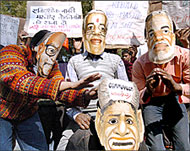India’s leftists no threat to markets
India’s leftist parties, whose support is critical for Sonia Gandhi’s new government, do not pose any real threat to economic reforms, analysts say.

With more than 60 seats, they are the third force in the new parliament and have decided to support prime minister-elect Sonia Gandhi from outside her coalition.
But confusing and at times contradictory comments by communist leaders alarmed financial markets and helped trigger the biggest one-day fall in the 129-year history of the Bombay exchange, Asia’s oldest, on Monday.
After deciding not to formally sign up to Gandhi’s coalition, due to take office in two days, the communists on Monday demanded farm subsidies should be increased and the privatisation ministry axed.
Welcoming foreign investors
But they also welcomed foreign investors and said they would back some privatisations, mainly of losing enterprises.
“There may be weeks, even months of uncertainty but over a period in time, reforms are inevitable,” said Barry Coulthurst, Melbourne-based senior economist at Australia and New Zealand Banking Group.
|
“There may be weeks, even months of uncertainty but over a period in time, reforms are inevitable” |
Bombay’s key share index fell as much as 16.6% on political concern and worries about margin calls after a series of falls over the three-week election that ended last week with the ouster of the Hindu nationalist Bharatiya Janata Party.
Trading was suspended twice for a total of three hours and the index rebounded to a less than 10% drop at one stage, but still closed down more than 11%. The rupee, which had been rising on record foreign investment, also dropped 0.8% before recovering with central bank support.
Power positioning
Most analysts write off some of the communist demands as rhetorical and ambit claims to boost their bargaining power as Gandhi draws up a blueprint for government, including her
economic agenda.
They point to Chinese-style reforms and efforts to woo foreign majors, especially in the information technology sector, in the states they run.
“The communists have a clear delineation between ideologues who run the party and pragmatists who stand in elections and
participate in governance,” said PK Basu, managing director
at Robust Economic Analysis Ltd, Singapore.
“Unfortunately, it is the idealogues who have been talking to the press in the past few days.” Jon Thorn, Hong Kong-based fund manager at India Capital Management, which oversees $100 million, said as long as these policies were not adopted by the Congress there was no risk.
The Communist party
The main communist group, the Communist Party of India (Marxist) (CPM), bitterly fought the ousted Bharatiya Janata Party’s reforms and was a strong critic of the policies of Congress itself, which began modernising the country – Asia’s third-largest economy – a decade ago.
 |
|
India’s communists are strong |
The CPM’s manifesto calls for foreign companies to be barred from the insurance business, an end to privatising banks and higher taxes on the well-off. But communist-ruled states such as West Bengal, have introduced their own reforms.
And this goes some way in mollifying investors. “The policies of the West Bengal government are no different from those of the … (BJP) government,” said Surjit Bhalla, New Delhi-based managing director of Oxus Fund Management, adding Congress’ win was not a mandate for an economic policy change.
Growth
The BJP and its allies privatised bloated and inefficient firms and liberalised the financial, power, infrastructure and telecoms sectors.
|
“Growth will remain the main draw for foreign investors and investments will continue into software, pharma, commodity cyclicals and auto, all of which are doing spectacularly well” PK Basu, |
In 2003, foreign funds poured $7.7 billion into Indian debt and equities in 2003, the most since they were first allowed to invest here in 1993.
“Growth will remain the main draw for foreign investors and investments will continue into software, pharma, commodity cyclicals and auto, all of which are doing spectacularly well,”
said Basu.
India’s economy expanded by 8.1% in the fiscal year to March and is expected to grow another 7% in 2004/05.
“The Congress party comprises some of the people who were at the forefront of the reforms and they are expected to come back to key posts,” said Amit Bhartia, San-Fransisco based portfolio manager at the $63 billion Grantham, Mayo, Van Otterloo & Co LLC which has about $700 million in Indian assets.